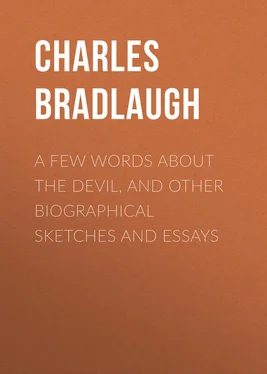Charles Bradlaugh - A Few Words About the Devil, and Other Biographical Sketches and Essays
Здесь есть возможность читать онлайн «Charles Bradlaugh - A Few Words About the Devil, and Other Biographical Sketches and Essays» — ознакомительный отрывок электронной книги совершенно бесплатно, а после прочтения отрывка купить полную версию. В некоторых случаях можно слушать аудио, скачать через торрент в формате fb2 и присутствует краткое содержание. Жанр: foreign_prose, на английском языке. Описание произведения, (предисловие) а так же отзывы посетителей доступны на портале библиотеки ЛибКат.
- Название:A Few Words About the Devil, and Other Biographical Sketches and Essays
- Автор:
- Жанр:
- Год:неизвестен
- ISBN:нет данных
- Рейтинг книги:5 / 5. Голосов: 1
-
Избранное:Добавить в избранное
- Отзывы:
-
Ваша оценка:
- 100
- 1
- 2
- 3
- 4
- 5
A Few Words About the Devil, and Other Biographical Sketches and Essays: краткое содержание, описание и аннотация
Предлагаем к чтению аннотацию, описание, краткое содержание или предисловие (зависит от того, что написал сам автор книги «A Few Words About the Devil, and Other Biographical Sketches and Essays»). Если вы не нашли необходимую информацию о книге — напишите в комментариях, мы постараемся отыскать её.
A Few Words About the Devil, and Other Biographical Sketches and Essays — читать онлайн ознакомительный отрывок
Ниже представлен текст книги, разбитый по страницам. Система сохранения места последней прочитанной страницы, позволяет с удобством читать онлайн бесплатно книгу «A Few Words About the Devil, and Other Biographical Sketches and Essays», без необходимости каждый раз заново искать на чём Вы остановились. Поставьте закладку, и сможете в любой момент перейти на страницу, на которой закончили чтение.
Интервал:
Закладка:
Charles Bradlaugh
A Few Words About the Devil, and Other Biographical Sketches and Essays
AUTOBIOGRAPHY OF CHARLES BRADLAUGH
A PAGE OF HIS LIFE
At the request of many friends, and by way of farewell address on leaving for America, I, for the first time in my life, pen a partial autobiographical sketch. I do not pretend that the narrative will be a complete picture of my life, I only vouch the accuracy of the facts so far as I state them. I have not the right in some cases to state political occurrences in which others now living are involved, nor have I the courage of Jean Jacques Rousseau, to photograph my inner life. I shall therefore state little the public may not already know. I was born on the 26th September, 1833, in a small house in Bacchus Walk, Hoxton. My father was a solicitor's clerk with a very poor salary, which he supplemented by law writing. He was an extremely industrious man, and a splendid penman. I never had the opportunity of judging his tastes or thoughts, outside his daily labors, except in one respect, in which I have followed in his footsteps. He was passionately fond of angling. Until 1848 my life needs little relation. My schooling, like that of most poor men's children, was small in quantity, and, except as to the three R's, indifferent in quality. I remember at seven years of age being at a national school in Abbey Street, Bethnel Green; between seven and nine I was at another small private school in the same neighborhood, and my "education" was completed before I was eleven years of age at a boys' school in Coalharbor Street, Hackney Road. When about twelve years of age I was first employed as errand lad in the solicitor's office where my father remained his whole life through. After a little more than two years in this occupation, I became wharf clerk and cashier to a firm of coal merchants in Britannia Fields, City Road. While in their employment the excitement of the Chartist movement was at its height in England, and the authorities, frightened by the then huge continental revolution wave, were preparing for the prosecution of some of the leaders among the Chartists. Meetings used to be held almost continuously all day on Sunday, and every week-night in the open air on Bonner's Fields, near where the Consumption Hospital now stands. These meetings were in knots from fifty to five hundred, sometimes many more, and were occupied chiefly in discussions on theological, social, and political questions, any bystander taking part. The curiosity of a lad took me occasionally in the week evenings to the Bonner's Fields gatherings. On the Sunday I, as a member of the Church of England, was fully occupied as a Sunday-school teacher. This last-named fashion of passing Sunday was broken suddenly. The Bishop of London was announced to hold a confirmation in Bethnal Green. The incumbent of St. Peter's, Hackney Road, the district in which I resided, was one John Graham Packer, and he, desiring to make a good figure when the Bishop came, pressed me to prepare for confirmation, so as to answer any question the Bishop might put. I studied a little the Thirty-nine Articles of the Church of England, and the four Gospels, and came to the conclusion that they differed. I ventured to write the Rev. Mr. Packer a respectful letter, asking him for aid and explanation. All he did was to denounce my letter to my parents as Atheistical, although at that time I should have shuddered at the very notion of becoming an Atheist, and he suspended me for three months from my office of Sunday-school teacher. This left me my Sundays free, for I did not like to go to church while suspended from my teacher's duty, and I, instead, went to Bonner's Fields, at first to listen, but soon to take part in some of the discussions which were then always pending there.
At the commencement I spoke on the orthodox Christian side, but after a debate with Mr. J. Savage, in the Warner Place Hall, in 1849, on the "Inspiration of the bible," I found that my views were getting very much tinged with Freethought, and in the winter of that year, at the instigation of Mr. Packer, to whom I had submitted the "Diegesis" of Robert Taylor, I – having become a teetotaler, which in his view brought out my infidel tendencies still more vigorously – had three days given me by my employers, after consultation with my father, to "change my opinions or lose my situation." I am inclined to think now that the threat was never intended to have been enforced, but was used to terrify me into submission. At that time I hardly knew what, if any, opinions I had, but the result was that sooner than make a show of recanting, I left home and situation on the third day, and never returned to either.
I was always a very fluent speaker, and now lectured frequently at the Temperance Hall, Warner Place, Hackney Road, at the small Hall in Philpot Street, and in the open air in Bonner's Fields, where at last on Sunday afternoons scores of hundreds congregated to hear me. My views were then Deistical, but rapidly tending to the more extreme phase in which they ultimately settled. I now took part in all the gatherings held in London on behalf of the Poles and Hungarians, and actually fancied that I could write poetry on Kossuth and Mazzini.
It was at this time I made the acquaintance of my friend and co-worker, Mr. Austin Holyoake, at his printing office in Queen's Head Passage, and I remember him taking me to John Street Institution, where, at one of the pleasant Saturday evening gatherings, I met the late Mrs. Emma Martin. At Mr. Austin Holyoake's request, Mr. George Jacob Holyoake, to my great delight, presided at one of my lectures in Philpot Street, and I felt special interest in the number of the Reasoner which contained a brief reference to myself and that lecture.
I wrote my first pamphlet, "A Few Words on the Christian's Creed," about the middle of 1850, and was honored by Dr. Campbell of the British Banner with a leading article vigorously assailing me for the lectures I had then delivered. After leaving home I was chiefly sheltered by Mrs. Sharpies Carlile, with whose children, Hypatia, Theophila, and Julian, I shared such comforts as were at her disposal. Here I studied hard everything which came in my way, picking up a little Hebrew and an imperfect smattering of other tongues. I tried to earn my living as a coal merchant, but at sixteen, and without one farthing in my pocket, the business was not extensive enough to be profitable. I got very poor, and at that time was also very proud. A subscription offered me by a few Freethinkers shocked me, and awakened me to a sense of my poverty; so telling no one where I was going, I went away, and on the 17th of December, 1850, was, after some difficulty, enlisted in the Seventh Dragoon Guards. With this corps I remained until October, 1853, being ultimately appointed orderly-room clerk; the regiment, during the whole of the time I remained in it, being quartered in Ireland. While I was in the regiment I was a teetotaler, and used often to lecture to the men in the barrack-room at night, and I have more than once broken out of Portobello barracks to deliver teetotal speeches in the small French Street Hall, Dublin. Many times have I spoken there in my scarlet jacket, between James Haughton and the good old father, the Rev. Dr. Spratt, a Roman Catholic priest, then very active in the cause of temperance. While I was in the regiment my father died, and in the summer of 1853 an aunt's death left me a small sum, out of which I purchased my discharge, and returned to England, to aid in the maintenance of my mother and family.
I have now no time for the full story of my army life, which, however, I may tell some day. Before I left the regiment I had won the esteem of most of the privates, and of some of the officers. I quitted the regiment with a "very good character" from the Colonel, but I am bound to add, that the Captain would not have concurred in this character had he had any voice in the matter. The Lieutenant-Colonel, C. P. Ainslie, earned an eternal right to grateful mention at my hands by his gentlemanly and considerate treatment. I can not say the same for my Captain, who did his best to send me to jail, and whom I have not yet quite forgiven.
Читать дальшеИнтервал:
Закладка:
Похожие книги на «A Few Words About the Devil, and Other Biographical Sketches and Essays»
Представляем Вашему вниманию похожие книги на «A Few Words About the Devil, and Other Biographical Sketches and Essays» списком для выбора. Мы отобрали схожую по названию и смыслу литературу в надежде предоставить читателям больше вариантов отыскать новые, интересные, ещё непрочитанные произведения.
Обсуждение, отзывы о книге «A Few Words About the Devil, and Other Biographical Sketches and Essays» и просто собственные мнения читателей. Оставьте ваши комментарии, напишите, что Вы думаете о произведении, его смысле или главных героях. Укажите что конкретно понравилось, а что нет, и почему Вы так считаете.












